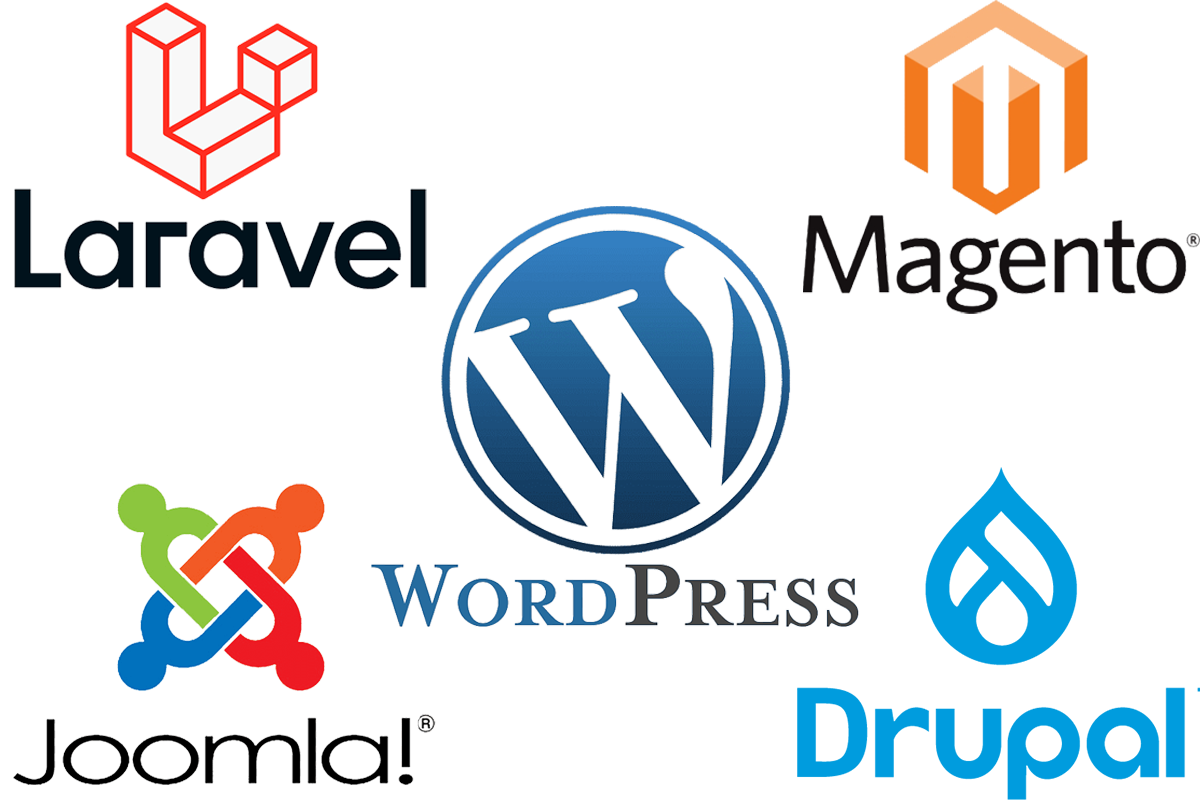Comparing Popular Web Platform CMS’s: WordPress, Magento, Laravel, Drupal, and Joomla

Choosing the right content management system (CMS) is a crucial step in creating a website that caters to your specific needs. This article provides an easy-to-understand comparison of five popular CMS platforms: WordPress, Magento, Laravel, Drupal, and Joomla. With this knowledge, even those with little technical background can make an informed decision about which platform best suits their requirements.
1. WordPress
- Overview: WordPress is the most popular CMS globally, powering over 40% of all websites. It started as a blogging platform but has evolved into a versatile CMS, suitable for various types of websites.
- Pros:
- Extremely user-friendly, even for beginners
- Offers thousands of free and premium themes and plugins
- Has a large, active community for support and resources
- SEO-friendly out of the box
- Cons:
- Can become sluggish with too many plugins or complex themes
- Regular updates can sometimes cause compatibility issues
- Customization may be limited for advanced users without coding knowledge
- Best for: Bloggers, small to medium-sized businesses, and users seeking a user-friendly, easily customizable platform.
2. Magento
- Overview: Magento is an e-commerce platform designed for online stores. It offers robust features and flexibility for businesses of all sizes.
- Pros:
- Specifically built for e-commerce, with advanced features and functionality
- Highly customizable and scalable
- Large community and marketplace for extensions
- SEO-friendly
- Cons:
- Can be resource-intensive, requiring powerful hosting
- Steep learning curve for non-technical users
- Customization and development can be expensive
- Best for: Medium to large-sized businesses seeking a powerful e-commerce solution.
3. Laravel
- Overview: Laravel is a PHP web application framework rather than a traditional CMS. It provides a foundation for developers to build custom web applications and websites.
- Pros:
- Elegant and modern syntax for efficient coding
- Highly customizable and flexible for building custom applications
- Strong security features
- Active community and extensive documentation
- Cons:
- Not suitable for non-technical users
- Lacks out-of-the-box features compared to other CMS platforms
- Requires a skilled developer for customization and setup
- Best for: Developers and businesses seeking a customizable framework for building custom web applications.
4. Drupal
- Overview: Drupal is a powerful, open-source CMS known for its flexibility and security. It’s suited for more complex websites and larger organizations.
- Pros:
- Highly flexible and customizable
- Strong security features
- Scalable for large websites and organizations
- SEO-friendly
- Cons:
- Steeper learning curve for non-technical users
- Requires development expertise for customization
- Less extensive theme and module library compared to WordPress
- Best for: Large businesses, government organizations, and educational institutions requiring a robust and secure platform.
5. Joomla
- Overview: Joomla is a flexible and user-friendly CMS, positioned between the simplicity of WordPress and the complexity of Drupal. It’s suitable for various types of websites, including e-commerce and social networking.
- Pros:
- User-friendly interface with a balance of simplicity and power
- Extensive library of templates and extensions
- Strong security features
- SEO-friendly
- Cons:
- Limited support community compared to WordPress and Drupal
- May require some development knowledge for advanced customization
- Updates can sometimes cause compatibility issues
- Best for: Users seeking a more advanced alternative to WordPress without the complexity of Drupal.
Conclusion
Each CMS platform has its strengths and weaknesses, catering to different user needs and website types. When choosing the right platform, consider factors such as ease of use, customizability, scalability, security, and the type of website you plan to create. For beginners and those seeking a simple, user-friendly platform, WordPress is a popular choice. Magento is best suited for e-commerce websites, while Laravel is ideal for developers building custom applications. Drupal offers robust security and scalability for larger organizations, and Joomla provides a middle ground between WordPress and Drupal in terms of complexity and flexibility.
By taking the time to understand the differences between these popular CMS platforms, you’ll be better equipped to make an informed decision and select the one that best meets your needs and goals. Keep in mind that your choice of CMS will have a significant impact on the overall success of your website, so it’s important to weigh the pros and cons carefully before making a decision.
Regardless of the platform you choose, remember that regular updates, maintenance, and security measures are crucial for maintaining a healthy and successful website. Additionally, consider the long-term growth of your website or business, as you may need to scale or add new features over time. A CMS that can adapt to your evolving requirements will be a valuable asset in the long run.
Lastly, don’t hesitate to seek professional assistance if you’re unsure about which CMS is right for you or if you require help with setup and customization. Web developers and designers have extensive experience working with